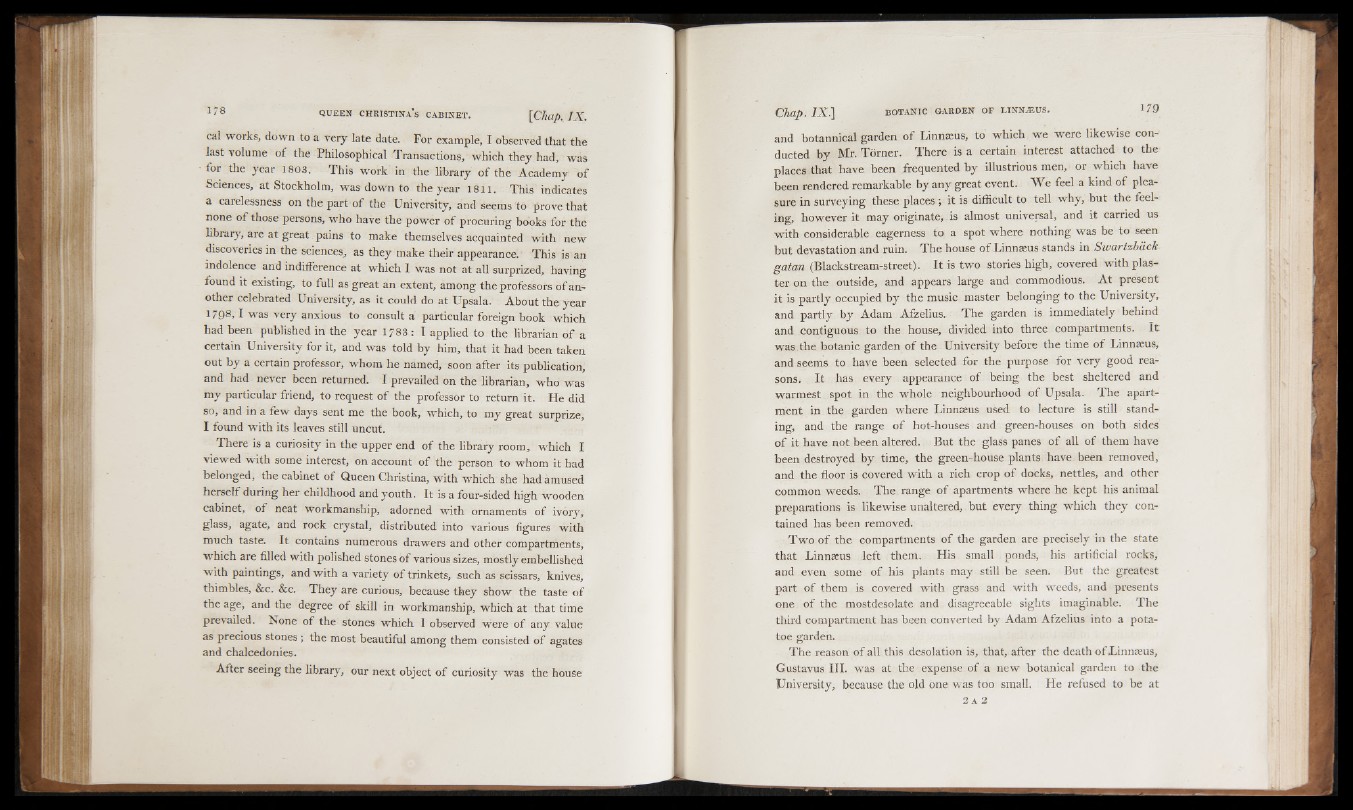
cal works, down to a very late date. For example, I observed that the
last volume of the Philosophical Transactions, which they had; ' was
for the year 1803. This work in the library of the Academy of
Sciences, at Stockholm, was down to the year 1811. This indicates
a carelessness on the part of the University, and seems to prove that
none o f those persons, who have the power of procuring books for the
library, are at great pains to make themselves acquainted with new
discoveries in the sciences, as they make their appearance. This is an
indolence and indifference at which 1 was not at all surprized, having
found it existing, to full as great an extent, among the professors of another
celebrated University, as it could do at Upsala. About the year
1798, 1 was very anxious to consult a particular foreign book which
had been published in the year 1783 : I applied to the librarian o f a
certain University for it, and was told by him, that it had been taken
out by a certain professor, whom he named, soon after its publication,
and had never been returned. I prevailed on the librarian, who was
my particular friend, to request o f the professor to return it. He did
so, and in a few days sent me the book, which, to my great surprize,
I found with its leaves still uncut.
There is a curiosity in the upper end o f the library room, which I
viewed with some interest, on account o f the person to whom it had
belonged, the cabinet of Queen Christina, with which she had amused
herself during her childhood and youth. It is a four-sided high wooden
cabinet, o f neat workmanship, adorned with ornaments of ivory,
glass, agate, and rock crystal, distributed into various figures with
much taste. It contains numerous drawers and other compartments,
which are filled with polished stones of various sizes, mostly embellished
with paintings, and with a variety of trinkets, such as scissars, knives,
thimbles, &c. &c. They are curious, because they show the taste of
the age, and the degree of skill in workmanship, which at that time
prevailed. None of the stones which 1 observed were of any value
as precious stones; the most beautiful among them consisted of agates
and chalcedonies.
After seeing the library, our next object of curiosity was the house
and botannical garden o f Linnaeus, to which we were likewise conducted
by Mr. Torner. There is a certain interest attached to the
places that have been frequented by illustrious men, or which have
been rendered remarkable by any great event. We feel a kind of pleasure
in surveying these places ; it is difficult to tell why, but the feeling,
however it may originate, is almost universal, and it carried us
with considerable eagerness to a spot where nothing was be to seen
but devastation and ruin. The house o f Linnaeus stands in Sivavtzhach
gatan (Blackstream-street). It is two stories high, covered with plaster
on the outside, and appears large and commodious. At present
it is partly occupied by the music master belonging to the University,
and partly by Adam Afzelius. The garden is immediately behind
and contiguous to the house, divided into three compartments. It
was. the botanic garden o f the University before the time o f Linnaeus,
and seems to have been selected for the purpose for very good reasons.
It has every appearance of being the best sheltered and
warmest spot in the whole neighbourhood of Upsala. The apartment
in the garden where Linnaeus used to lecture is still standing,
and the range of hot-houses and green-houses on both sides
o f it have not been altered. But the glass panes of all of them have
been destroyed by time, the green-house plants have, been removed,
and the floor is covered with a rich crop of docks, nettles, and other
common weeds. The range o f apartments where he kept his animal
preparations is likewise unaltered, but every thing which they contained
has been removed.
Two of the compartments of the garden are precisely in the state
that Linnaeus left them. His small ponds, his artificial rocks,
and even some of his plants may still be seen. But the greatest
part of them is covered with grass and with weeds, and presents
one of the mostdesolate and disagreeable sights imaginable. The
third compartment has been converted by Adam Afzelius into a pota-
toe garden.
The reason of all this desolation is, that, after the death o f Linnaeus,
Gustavus III. was at the expense of a new botanical garden to the
University, because the old one was too small. He refused to be at
2 a 2